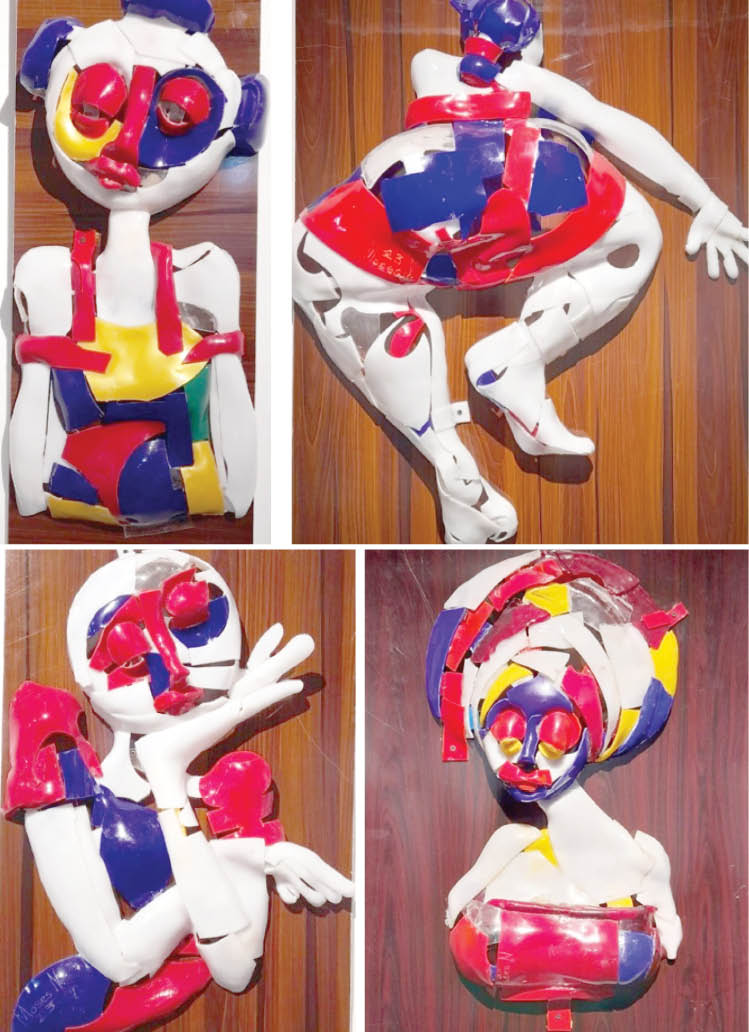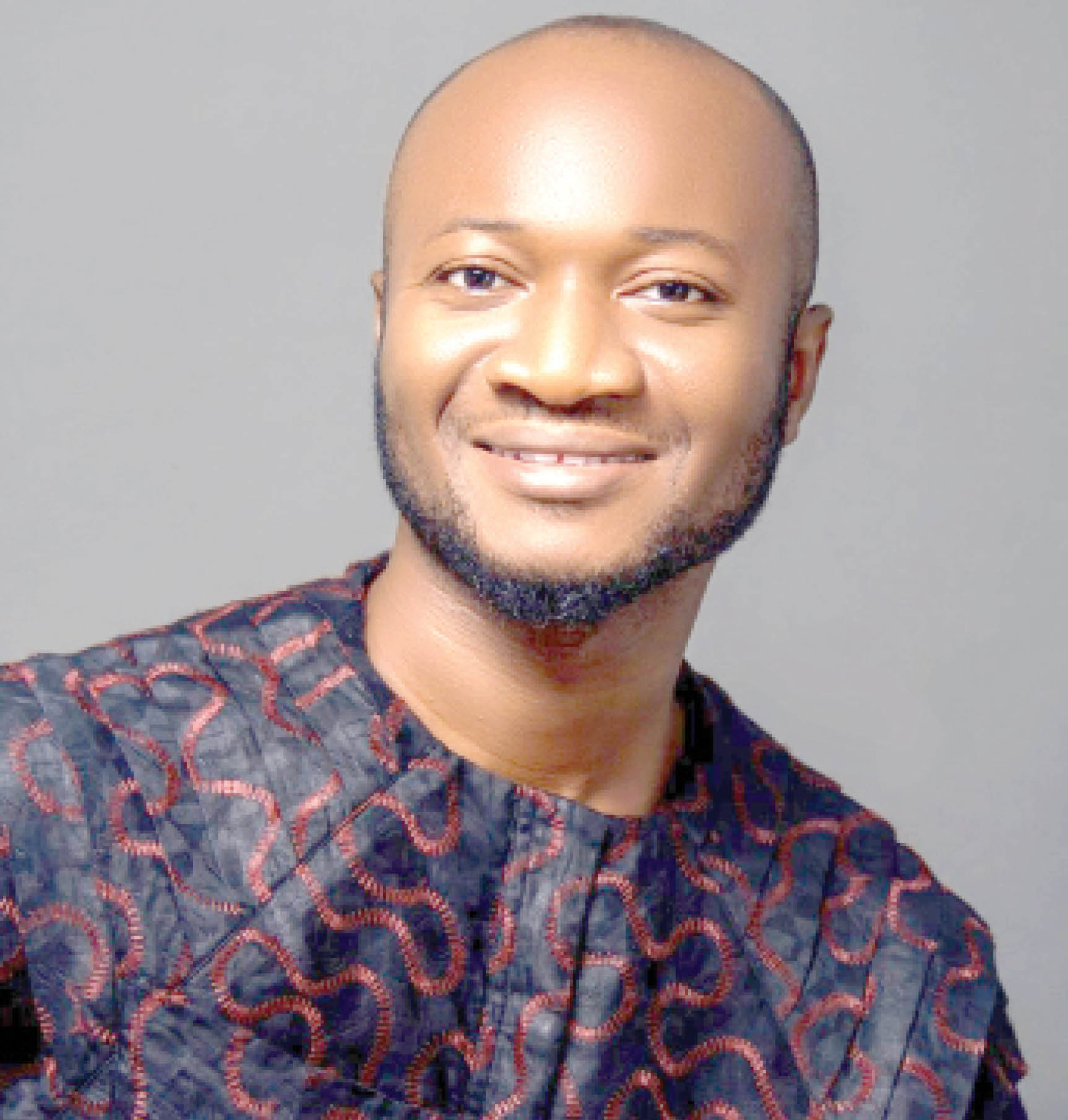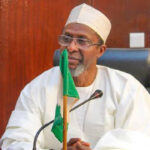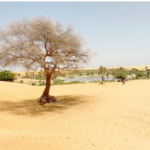Moses Oñugadi Njoku is a sculptor whose major interest is using waste materials and plants to sculpt. In this interview, he shares his story and background in the art world.
What is your background in art?
I studied Fine and Applied Arts (Sculpture) at the Nnamdi Azikiwe University Awka. I have a masters degree (MFA) in sculpture from the same university. Currently, I’m undergoing PhD studies at the University of Benin. I lecture at the Nnamdi Azikiwe University Awka (Fine and Applied Arts Department). I see myself as a versatile artist who engages in exploratory art. Experimenting with different mediums for sculptures, with particular interest in discarded plastics and living flowers. I’m also the assistant secretary of Society of Nigerian Artists (Anambra State chapter) and a member, Sculptors Association of Nigeria (SCAN).
How did you become an artist?
Art came naturally to me. From little drawings I used to scribble on the ground around our family compound, to copying portraits I used to see on church calendars and other printed sources available to me (they were quite few). As a child, I spent most of the inner pages of my exercise books on drawings. I only loved reading books that had lots of images, as they serve as references and motivations that spur me to draw always.
Boro: How cradle of Ijaw struggle became NYSC camp
Nnamdi Azikwe play to hold April 9,10
I grew more conscious of my gifts and became more confident from Primary 4. My teacher then, Sir Ihemtugo, at Central School Ụmụaka, Imo State, started encouraging me to produce drawings on cardboards as my ‘handiwork’ (handiworks were mandatory crafts that were made by pupils in primary schools in the 90s and early 2000s).

That was the first time I realized the value of my gift, however crude it was then. From then, I became the go-to guy for teachers when they wished to make drawings on the boards for illustration and when they needed to make good drawings in their lesson notes. Nevertheless, I was not lucky enough to be in secondary schools that had committed art teachers, therefore, my affinity for art dwindled. I chose to specialise in the sciences in my senior secondary. However, towards the end of my senior secondary, I started thinking deeper what career path to take after school. So, I approached the school’s Guidance Counsellor who encouraged me to introspectively think about what my gifts are and try to develop them. At that point, I decided to at least elect to study Visual Arts and write the paper in my Senior Certificate Examination, making it the only art subject I was to write. I approached a hitherto non existing fine art teacher in the senior classes who informed me that I would not be allowed to write the subject alone except I was able to convince other classmates to join me; I succeeded, and 13 of us offered Visual Arts in WAEC, the rest they say is history.
What is your favourite medium?
My artistic style takes inspiration from the limitless abundance of sculpture media to create works of art that showcase the concepts of repurposing, reusing and environmental sustainability. My use of discarded waste materials especially plastics and metal junk in producing art is aimed at showcasing the inherent aesthetic beauty of materials when they are repurposed, and by so doing raise the consciousness of the society towards addressing the issues of consumerism and sustainability.
I also work with concrete and I have most of my public art commissions on the medium. Cement allows me to work in the direct concrete modelling technique which is faster, stronger and more cost effective.
How would you describe your creative process?
I consider my creative process to be a mixture of spontaneity and introspective brainstorming. Sometimes, I allow the medium to speak to me intuitively as to what it should look like or what form it wishes to take. Sometimes, ideas come to me, and I would have to go through the stages of thought/imagination-design/drawing-fabrication/modelling. Whatever be the result, Dewey’s theory of process always comes true in my work, where the process is as important and enjoyable as the product. This gives my works some form of surface/ formal character that appears to suggest the process of making, thereby drawing the audience into the moment of making which precedes the object in view, and making the audience an active participant in the creative process.
What function does an artist serve in the society?
I have always been motivated by the idea that an artist is like a mirror to the society, therefore I work with the mindset that in one way or the other, my art will have positive impact on the general public who come in contact with it. I derived this idea from Ivan Pavlov’s Conditioning Theory, and believe artists are the social vanguards that enables the society measure its progress and celebrate its richness, as well as act as its moral compass.
What social issues do you pursue in your art, and why?
I have a personal style that addresses social and environmental issues both thematically and in use of materials. In general, I see myself as being a crusader for the environment through my art, and I strive to create works that supports nature and better living environment for all. My interest in environment and sustainability led me into experiments with materials such as living plants and most recently, discarded materials, mainly plastics and found objects, to produce upcycled works of art. I also love to make works that speak to social behaviours and telling the contemporary African story.
When working on a difficult project, how do you maintain your motivation?
When working on difficult projects, I ensure to have mental pictures of what I hoped to achieve, however, I often give room for adjustments and intermittent breaks to appraise the work in progress and relax my brain. Reading and listening to music and sports in-between work helps me to sustain the motivation as well.
What is your artistic viewpoint on life?
I’m of the view that art should first and foremost appeal to the senses and then the emotions and lastly reason. Ultimately, it should lead to the good of man.
How do you fix your prices?
Pricing for me depends on several factors. It’s never fixed. Such things as cost of production, which most times depends on medium, size, time, logistics and level of difficulty, type of client and relationship, all contribute to the value of the final work. However, I do not allow price come between I and a client who shows great admiration for my work.
Which reactions to your work stand out in your mind?
I cherish the ‘wow’ feelings that my work evokes in people who come across it. Also, I love stepping back to observe how the audience interact and empathize with the work; that moment of childlike display of imitation.
Describe your ideal space to create an idea or work?
Studio space with my working tools close by is all I require for production. And of cause, abundance of working materials and steady electricity. However, ideas come to me in myriad of places, and all I need then is a piece of paper and pen.
What’s the best piece of advice you’ve been given?
To concern myself more with having my works in private and public collections than emphasis on price per sale/commission.
Professionally, what are your goals?
I’m striving to broaden my cultural and human experiences to improve the repertoire of creative energy available to me. In academics, I have interest in art history, especially, African history of art and architecture. I also hope that somehow, I shall be able to influence my students to trust the process and show them by example the path to artistic greatness.
Ultimately, it is my goal that my art/name will become a global brand.
What are your biggest motivations?
I find my motivation to be intrinsic, although I find the works of great masters as challenge for me to do more. I however consider artists who are able to double as scholars (academics) and working artists as genius. To me, this is the greatest calling. And they are quite few.
Whose work would you like your work to be compared to?
I want people to think about how creative God is when they behold my work.

 Join Daily Trust WhatsApp Community For Quick Access To News and Happenings Around You.
Join Daily Trust WhatsApp Community For Quick Access To News and Happenings Around You.


